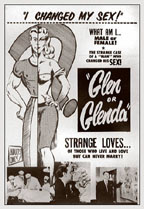Glen or Glenda? (a.k.a. I Changed My Sex)
| There are bad movies. Then there are really bad movies. Then there are laughably bad movies. And somewhere under there, resides the lifework of Edward D. Wood, Jr., the worst director in the history of cinema. He was so bad he literally invented his own bottom rung, and it's hard to believe that he didn't do it intentionally. But, from all accounts, Wood was positively assured that he was good director, and he was honestly baffled why no one understood his films. I was first introduced to this director by Tim Burton's finely crafted 1994 biopic "Ed Wood." I loved Burton's film, but I kept thinking, "Surely Wood's movies weren't that bad. I mean, how bad could they possbily be?" Well, I answered that question for myself when I rented his first major film, the semi-autobiographical 1953 shlockfest "Glen or Glenda." The film is so inept that I don't know where to start. It's about sex change operations and, more importantly, transvestites, which Ed Wood was in real life. He was a practicing, married heterosexual, but he enjoyed wearing women's clothing, especially angora sweaters. With "Glen or Glenda," Wood attempted to make a case for the normalacy of transvestites, and why society should accept them. "Why should we be shocked by this headline?" the narrator asked as the camera moves in on a newspaper reading: "MAN CHANGES HIS SEX." Some have suggested that Wood was actually ahead of his time by tackling such taboo subjects are arguing for the acceptance of those with differing sexual preferences, but I think that might be giving him too much credit. Through some twisted logic, Wood tries to explain that people once thought flying was weird, but now it's accepted. "If God had wanted us to fly, he would have given us wings," an old lady croons in a voice-over, which is the film's way of suggesting that some day, men wearing women's panties will be as everyday as getting on American Airlines. Wood's other classic bit of reasoning concerns the idea that women's clothing is more comfortable than men's, hence why men wearing women's clothes is perfectly natural. The film tries to convince us that men's hats are too tight, cutting off the blood circulation to the head and causing baldness, while women's hats don't. "Seven out ten men wear hats," the narrator tells us in a grave voice. "And seven out of ten men are bald." The loose structure of the film concerns a psychiatrist (Timothy Farrell) trying to explain to a police detective (Lyle Talbot) about the nature of transvestites and hermaphrodites. He uses the example of Glen (Ed Wood, acting under the name Daniel Davis), a seemingly normal man who is engaged to a beautiful woman (Dolores Fuller). But, what she doesn't know is that Glen likes to dress up like a woman. And then there's another story about Alan ("Tommy" Haynes), a hermaphrodite who goes all the way and has a complete sex change operation to become a woman. Of course, Wood is too scatterbrained to keep his attention on one thing, and the film flies around in every conceiveable direction, constantly intersplicing stock footage of thunderstorms and highways and busy city streets. There's even one scene of what appears to be a man attempting to rape a woman on a couch, and I still have no idea what it had to do with anything. Half of "Glen or Glenda" feels like a poorly made educational film you had to watch in fifth grade. It has that same kind of droning narrator voice, and cheesy actors demonstrating what the narrator is talking about. A classic example of this is the film's harkening back to ancient times when it was the men who wore all the fancy jewelry and make-up. Wood proves his point by staging some kind of African tribal ritual that looks like it was shot in his backyard. Of course, the most laughable aspect of "Glen or Glenda" is the once-great Bela Lugosi. He appears at the beginning of the film, sitting in a leather chair was a huge book in his lap in front of a bookshelf filled with skulls. It looks like he's about to introduce an episode of "Tales From the Crypt," but instead he starts babbling a string of completely incoherent sentences that have nothing whatsoever to do with the story. Lugosi was an opium addict at this low point in his life, and I have no doubt that he was in a drug-induced haze during the filming. Wood was just so happy to have an established actor like Lugosi in one of his films, that he didn't care what he did. Lugosi pops up at random times during the movie to utter something, and I'll never forget the scene with him superimposed over stock footage of a herd of buffalo shouting, "Pull the strings! Pull the strings!" And, then of course, there's the time when he starts babbling, "Bevare! Bevare of the big green dragon that sits on your doorstep. He eats little boys... Puppy dog tails, and big fat snails... Bevare... Take care... Bevare!" I could go on, but I think you get the picture. I have no theories about how Ed Wood could be this inept at writing, editing, and filming movies. His films are so audacious in their absurdity that they are funnier than most intentional comedies. However, in some ways I find his movies sad because I realize how badly Wood wanted to be respected in the film industry, and instead he would up labeled the Worst Director of All Time, and died an alcoholic, making hard core porno movies for a living. ©1997 James Kendrick |
Overall Rating:  (1)
(1)


